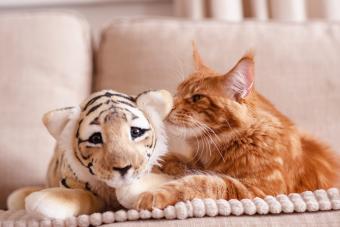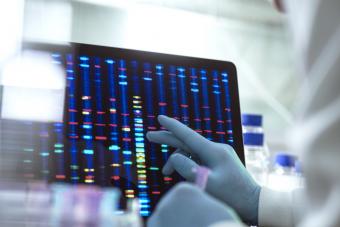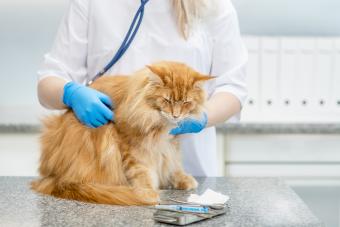
Most of us have heard about having our DNA tested, and some dog owners know about services that can tell them more about their dog's ancestory. However, not everyone is aware that DNA testing for cats is becoming way more popular.
It isn't just about figuring out what breed your cat is, either. You can find out more about their health and any conditions you might need to watch out for. Understanding the costs of DNA testing, what it can and can't tell you, and how you can use this information to help you cat are all things you should consider if you're thinking about paying for this service.
What Cat DNA Tests Look For
If you choose to give your cat a DNA test, there are several things you'll find out. These include your cat's ancestry, behavioral traits, and health care information. The good news is, modern feline DNA testing has become much more accurate and precise, and can help identify genes that are responsible for inherited diseases, among other things.
Your Cat's Ancestry
A DNA test can give some insight into your cat's ancestors. Many pet parents want to know what breed their cat is, but if they're a mixture of breeds, it can be hard to tell. The DNA test will tell you which breeds your cat is mixed with.

There are 45 recognized cat breeds, according to the Cat Fanciers' Association. Despite improvements in DNA testing, however, they can't reveal your cat's breed mix with 100% certainty.
Your Cat's Behavior
Once you know your cat's breed (or you at least have a clearer idea of their mix), you can better understand their behavior and personality. By testing for your cat's breed makeup, you can better understand and manage behavioral traits. This can help strengthen the bond between you and your feline family member.
Caring for Your Cat
Getting a clearer picture of your cat's genetic makeup can help you tailor their diet, exercise, and overall care to their specific needs. For instance, some breeds may require more physical activity or have unique dietary considerations. Insights from a DNA test can help you make informed decisions to meet your cat's specific requirements.
What DNA Tests Are Most Helpful For
Although DNA tests have a range of uses, there are three particular situations that make DNA tests particularly valuable. While knowing what breed your cat is sounds interesting - and is often the reason people are attracted to DNA testing in the first place - the main benefits are to help anticipate potential diseases, and to improve breeding.
Preventative Care Options
Like us, cats can inherit genetic health conditions. Having your cat's DNA tested can identify any specific genetic markers our cat may be carrying. These genes may be associated with certain diseases, such as polycystic kidney disease, among others.
While the results do not guarantee your cat will develop these conditions, they can serve as a guide for preventive care and early intervention, potentially prolonging your cat's life and enhancing their quality of life.
To be clear, just because your cat tests positive for specific genetic markers that might be associated with a particular disease, this doesn't mean your cat has that disease. Or that they will ever develop that disease. What these tests can do for you and your cat, however, is give you a heads up so you know what might happen down the road.
Helping Cat Breeders
For purebred cats, a DNA test can verify lineage and provide a comprehensive ancestry report. This can be valuable for both breeders and prospective owners. This can make the breeder's business more credible and provide pet parents with peace of mind about their purchase.
Identifying breed-specific ailments and genetic abnormalities can also help breeders eliminate unwanted genes from their breeding program. Over time, this should help eliminate various genetic diseases from modern cat breeds. Anything that can help cats and their owners avoid suffering from an disease or condition is a big win, in our books.
Preventing Inbreeding
Testing DNA to avoid inbreeding among cats can prevent birth defects and problems breeders have to worry about. Inbreeding, or breeding between closely related cats, can increase the risk of the kittens in the litter experiencing genetic disorders. Testing their breeding stock's DNA to check for similarity and ensure genetic diversity means breeders are likely to produce healthier kittens.
How Cat DNA Tests Work
Cat DNA tests are similar to human DNA tests. To conduct the test, you'll need to collect a DNA sample from your cat, which is usually done by swabbing the inside of the cat's cheek to gather cells.
Once collected, the sample is sent to a laboratory where it's analyzed. The lab technicians will extract the DNA from the cells and then run it through a process that identifies the unique sequences in your cat's genetic code. It really is as easy as taking a swab, mailing it in, and waiting for your cat's results.

By comparing these sequences with their database of known cat breed genetic markers and traits, they can determine your cat's ancestry, identify some genetic health risks, and even provide some insight into generalized behavior traits. Once the lab is finished, the results are compiled into a report and sent back to you. The entire process can take a few weeks, depending on the company.
How Much Do DNA Tests for Cats Cost?
The cost of a cat DNA test can vary depending on how much information you're looking for and the company conducting the test. On the lower end, basic breed identification tests can cost around $50 to $70.
However, more comprehensive tests that provide detailed health screenings, breed identification, and trait analysis can run upwards of $100 to $200 or more. These more expensive tests are generally from organizations that have an extensive breed database and can test for a larger number of genetic health conditions.
It's important to do your research and understand what each test offers to ensure you're getting the information you desire for the price you're willing to pay.
Pros and Cons of Cat DNA Testing
It boils down to this: If you're just curious about your cat's breed and you don't have a lot of money to spend, we suggest you skip DNA testing. However, if you want to know more about any health conditions your cat might have, or you plan to breed your cats, getting their DNA tested may be a no-brainer.

Pros
- Insights into health: Cat DNA tests can identify genetic markers for genetic conditions. This information can help you proactively manage your cat's health and even prevent the onset of some conditions with early care.
- Breed identification: If you've ever been curious about your cat's history, a DNA test can offer answers. This is particularly useful for owners of mixed-breed cats, who often find it difficult to pinpoint their pet's heritage.
- Getting to know behavior traits: Understanding your cat's breed or mix can help you better recognize why they act the way they do. Certain breeds have unique personality traits, and identifying these can aid in training and managing your cat's behavior.
- Customized care options: With better knowledge of your cat's breed and genetic health risks, you can tailor their diet, exercise, and overall care to their specific needs.
Cons
- Accuracy: While cat DNA tests can provide a wealth of information, they're not always 100% accurate. The accuracy depends on the size of the company's breed database, and some tests might not accurately identify rare breeds.
- Limited disease detection: While DNA tests can detect certain genetic diseases, they can't detect all potential health issues. Some conditions, like many cancers, are caused by environmental factors or develop over time, and DNA tests cannot predict whether your cat will develop these, in all cases.
- Stress to the pet parent: According to Dr. Lisa Moses, a veterinarian at Harvard Medical School, many pet parents visit the vet clinic once they receive DNA test results requesting expensive tests that are not necessary. Just because your cat has some markers for a certain condition, that doesn't mean they will inherit it.
- Stress to your cat: Some cats might find the process of taking a DNA sample stressful or uncomfortable. However, it's a relatively painless procedure, overall, and shouldn't deter you if you have a good reason to test your cat's DNA.
- Cost: DNA tests can be quite expensive, and the cost may not be justifiable for all pet owners, especially if you're not interested in breed information and your cat is healthy.
The bottom line is this: The main benefit of testing your cat's DNA is understanding their health risks. Weigh the cost against the test's preventative value to figure out if testing is right for you.
Choosing to Buy a Cat DNA Kit
If you are genuinely curious about what breed your cat is, have a strong desire to know what genetic markers they carry for disease, or want to provide prospective pet parents with proof of purity, the cost could be worth it to you. If you aren't overly interested, you may just want to take a look through a cat breed book or cat breed photos to help figure out what breed your cat is.







